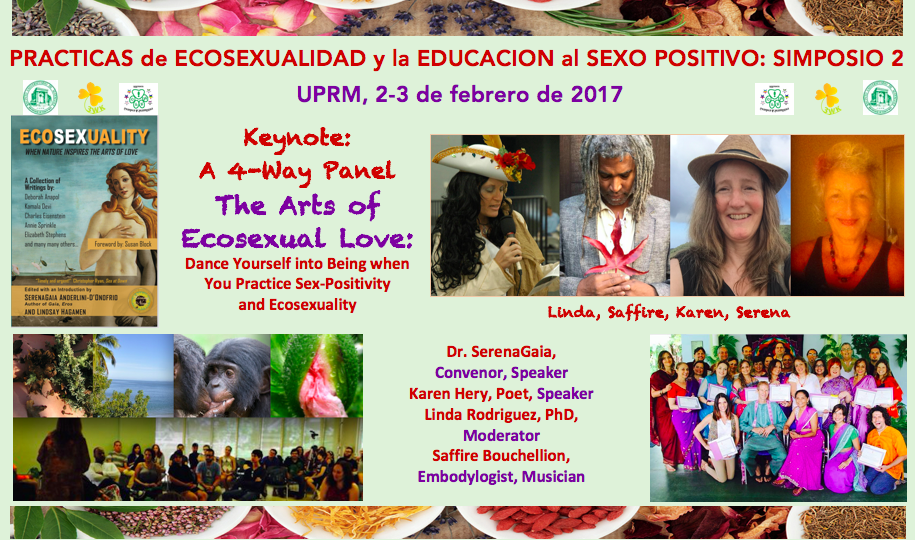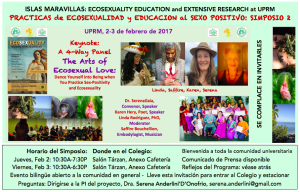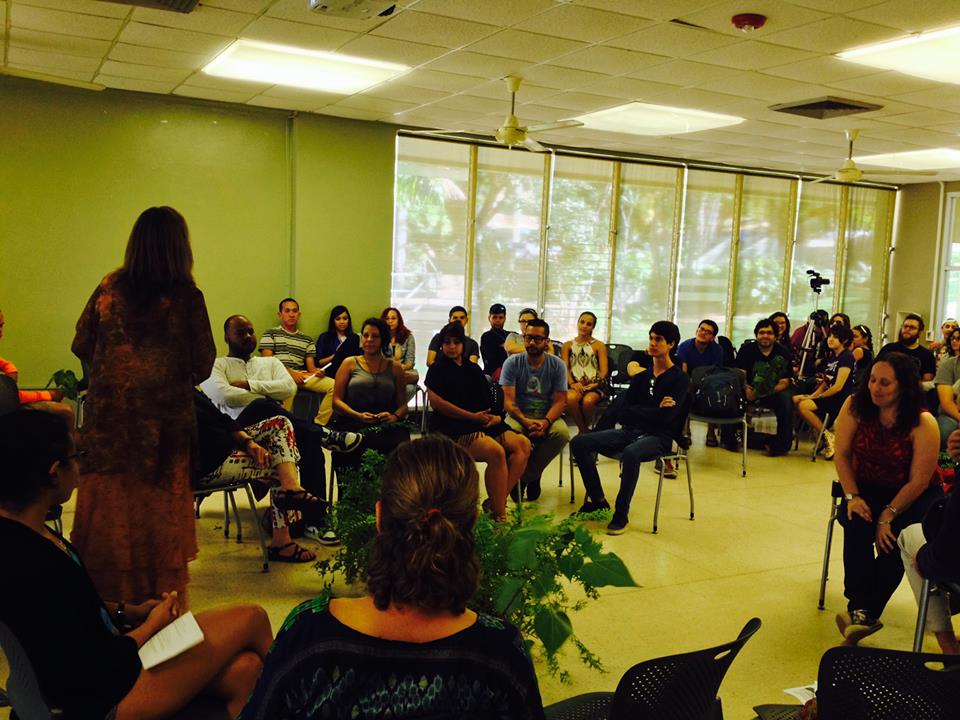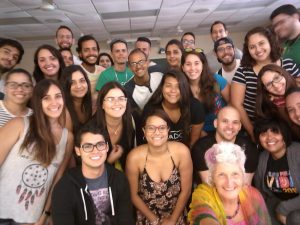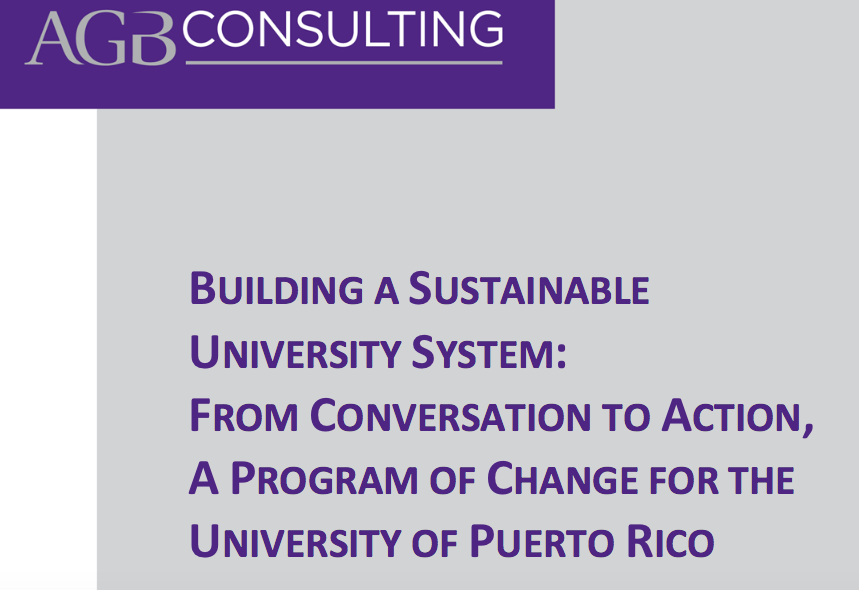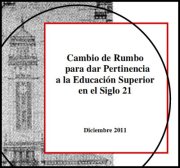Listen to all of it and view on Democracy Now!
In Puerto Rico, an ongoing strike by students at the University of
Puerto Rico is coming to a head. Riot police have surrounded the main
gates of the university’s main campus and are trying to break the
strike by denying food and water to students who have occupied the
campus inside. The strike began nearly four weeks ago in response to
budget cuts at the university of more than $100 million. On Thursday,
a mass assembly of more than 3,000 students voted overwhelmingly to
continue the strike. The next day, riot police seized control of the
main campus gates. We go now to Puerto Rico, inside the occupied
campus at the university. [includes rush transcript]
To read, listen to, or watch the whole story:
http://www.democracynow.org/2010/5/17/student_strike_at_university_of_puerto
Guests:
Giovanni Roberto, student at the University of Puerto Rico and a
spokesperson for the striking students.
Christopher Powers, professor of comparative literature at University
of Puerto Rico.
Rush Transcript
This transcript is available free of charge. However, donations help
us provide closed captioning for the deaf and hard of hearing on our
TV broadcast. Thank you for your generous contribution.
Donate – $25, $50, $100, More…
AMY GOODMAN: In Puerto Rico, an ongoing strike by students at the
University of Puerto Rico is coming to a head. Riot police have
surrounded the main gates of the university and are trying to break
the strike by denying food and water to students who have occupied the
campus inside.
The strike began nearly four weeks ago in response to budget cuts at
the university of more than $100 million. Students called on the
administration to reconsider the cuts and sought guarantees, such as
no fee increases and no privatization of campus services. Students
initially called for a forty-eight-hour strike, but more than three
weeks later the strike continues and has spread to ten out of eleven
campuses. On Thursday, a mass assembly of more than 3,000 students
voted overwhelmingly to continue the strike. The next day, riot police
seized control of the main campus gates.
The striking students have received widespread support from professors
at the university, as well as unions around the country. Crowds have
gathered outside the university gates, where police have encircled the
striking students inside. Parents, family members, other supporters
have tried to throw bottles of water and food over the fence to
support the strikers.
We go now to Puerto Rico inside the occupied campus at the university,
where we’re joined by Giovanni Roberto, a student at the University of
Puerto Rico and a spokesperson for the striking students. We’re also
joined by a professor at the university, outside the campus, who’s
supporting the students. Christopher Powers is a professor of
comparative literature at UPR. He joins us on the phone.
We welcome you both to Democracy Now! Giovanni, we’ll begin with you.
Describe the scene right now and what your demands are.
GIOVANNI ROBERTO: Hi, Amy, and hi, people watching.
Our first—our main demand was that we reject certification of the
trustees of the university that tried to limit the tuition waivers to
students. Especially they tried to make people that have a Pell Grant
or other economic help not to be part of the tuition waiver, which in
the University of Puerto Rico, which is a public university, most of
students have economic aids in order to go to the university and
study. So we identify that the administration, what they wanted to do
is to attack especially poor students, trying to limit their right to
have a tuition waiver.
Right now in the university, we are inside. We remain for more than
twenty-seven days on strikes. We are occupying the whole campuses. As
you say, ten out of eleven campuses are shut down by students. Inside
the university is calm. We are—we have been receiving a lot of people
outside the fences helping us to resist the possibility of the police
to get in.
Since the first day, the administration demonstrate no will to
negotiate with students. Our first demand was that they’re beginning
to negotiate. We only want to negotiate with the administration our
demands. We have been working for more than one year. And after that,
we have no other solution than to go on strike, as we’re doing now,
trying to push the administration to negotiate. And they only use the
force. They’re trying to get the police in and trying to make us get
out. And that’s one of the demands.
AMY GOODMAN: Let me bring Professor Powers into this, professor at the
University of Puerto Rico. Can you talk about the scene there, as
well, the students outside, the professors—the students inside, the
professors outside?
CHRISTOPHER POWERS: Yes. Well, thank you for having me on the show.
I’m a professor at the Mayagüez campus of the UPR, so I’m not in San
Juan right now. But I can report that the strike is being maintained
at all of the eleven campuses—that’s a minor correction—because the
eleventh campus was closed today by the staff union, which represents
about 2,000 maintenance workers in the system. The staff union has
also closed the administrative buildings, the central administrative
buildings located in the botanical gardens, this morning. They moved
in heavy machinery, closing the gates, and have called for a weeklong
strike in support of the students. So all of the campuses are closed
right now. And the union is calling for the closure, as well, of
auxiliary institutions, as well. So the strike has indeed spread to
the entire system.
It has also sparked widespread support on the part of professors, for
one, but also the broad public. Parents are involved in supporting the
students in an unprecedented way compared with the strikes in the
past. The use of force to close the main campus has sparked wide
sympathy with the students. It should also be noted that the
University of Puerto Rico is a university of 64,000 students. It’s the
largest university in the Caribbean. And it’s also the premier
institution of higher learning in the country. It’s considered part of
the cultural patrimony of the island. It has produced the island’s
best and brightest. And in the context of the colonial status of the
island, in which historically so much of Puerto Rican—Puerto Rico’s
resources have been sold out to foreigners, the UPR is widely regarded
as the last best resource that the nation has to keep. So attack on
the integrity of the institution, the restriction of access for
working-class students, and the fears of privatization of the
university have sparked very wide public support.
AMY GOODMAN: Who controls the budget exactly, I mean, in relation—for
people on the mainland in the United States, given the relationship
between the United States and Puerto Rico?
CHRISTOPHER POWERS: Right. Well, the budget of the university is
controlled by the presidency and the board of trustees. According to a
law from 1966, 9.6 percent of the income into the general funds of
Puerto Rico are to be used by the university. However, the current
conservative, pro-statehood New Progressive Party government issued a
law called “Law No. 7,” which is widely unpopular on the island, which
gave them emergency powers to effect fiscal measures. And this law has
been implemented in the, oh, year-and-a-half or so of the Fortuño
administration to lay off public workers, and now it’s been applied to
deny funds that have been historically available to the university.
This has caused a deficit which could be $100 million or more,
although those are based on estimates at this point.
At any rate, the austerity measures that the board of trustees and the
presidency are trying to impose have been disproportionately directed
at students, professors and staff and have not at all touched the
bloated budgets for the central administration and the chancellors’
offices. So there’s a very—you know, a sense of injustice and
unfairness in the application of the austerity measures, and the
students are not taking it. They have maintained the strike and
haven’t budged from the camps that they’ve set up at the gates of the
various universities.
It’s a very multi-sectorial movement, the students. It’s not just the
traditional activists who are protesting. The tuition waivers that
Giovanni was mentioning apply to groups like athletes and musicians,
so these students are also involved in the protests. It’s a very
exciting movement. And the mood is quite electric. And the students,
like I’ve said, have inspired a lot of inspiration and support on the
part of the population. There’s a phrase circulating now that this new
generation of students is the basta ya generation, the “enough is
enough” generation.
AMY GOODMAN: Giovanni Roberto, what are your plans now, with the SWAT
teams having moved in? Where do you go from here?
GIOVANNI ROBERTO: Well, we’re still demanding the administration to
negotiate, actually. I think the general strike called for tomorrow is
a good step forward in order to push the administration and push the
government, as part of that administration, to sit down in the table
of negotiation. We’re only demanding that we need to negotiate our
demands.
Right now, we’re going to still have—we’re going to continue to
strike. We are not going to let us intimidate by the police. We know
that if the people remain supporting us, as they have been doing for
the last three weeks, we don’t think the police are going to get in or
try to get in, because that will be a political—a serious political
problem for the government, because we think that all that support, in
water and food or in picket lines in front of the university, will
transform in mass mobilization in this country. And that’s what we’re
hoping, that all of that solidarity that have been expressed in
different ways in the last three weeks transform, today and tomorrow
and the rest of the weeks, in mass mobilization and mass protest,
especially in the strike of tomorrow. So we are going to remain on
strike, and we’re going to continue asking negotiation with the
administration.
AMY GOODMAN: Have you had support from students on the mainland United
States? And what have been the effect, for example, of the student
protests in California? Have you been following them, Giovanni?
GIOVANNI ROBERTO: Yeah, we received a letter of students and
professors of Berkeley and CUNY in New York, from Canada, from Spain,
from Venezuela, and from other countries, from República Dominicana.
We have received international attention, because, like in California,
we are receiving attacks, a budget cuts attack. And we think that the
defense of the public university obviously is not only here in Puerto
Rico; it’s an international fight against privatization and against
things that affect students. So, obviously, what happened in
California affects us. Before the strike, we made two occupations of
two faculties, in some way inspired by what’s happened in Berkeley and
the fight that Berkeley was having there. So I think for them to us
and from our fight to them, there’s a relationship between our fight
and an inspiration, a mutual inspiration, right now.
AMY GOODMAN: I understand there was a father who was trying to bring
food to his son, a student inside, who was attacked. Giovanni Roberto,
what happened?
GIOVANNI ROBERTO: Yeah, he was trying to get in bread and water, which
is in the morning for breakfast, and the police attacked him and
pushed him to the ground and then arrested him in front of all the
students. We have a video of that. That same day, in the morning, too,
another student was trying to get in, and the police attacked the
student, pushed him to the ground, hit him while he was on the ground,
and then arrested him. That happened two days, yesterday, happened
again with artists that wanted to get food inside the
university—actors, singers, famous Puerto Rican singers. They didn’t
allow them to get food, and they had to throw it over the fences in
order to get the water inside the university. There’s a law that don’t
allow any food or water to get in, according to a judge.
So, right now the situation is tense outside. We have more food than
ever. That’s important to people to know. We are creating ways to get
food and water inside. And the solidarity of the people is so
impressed that now we have food like for two weeks. So even there you
see the picture. No matter the police, what try the police, we know
that we’re going to continue the strike and that we’re going to win
this strike. We have the whole country on our side. We have the right
to do this. And we are defending only public education, public
university. That’s not a crime. One of our slogans is that we are
students, not—we’re not making crimes, you know? So—
AMY GOODMAN: Christopher Powers, the support of unions, can you talk
about that, like the AFL-CIO?
CHRISTOPHER POWERS: Yes. Well, there’s a general strike called for
tomorrow. This strike was called both by the coalition of unions,
which includes the Change to Win, the Federation of Workers of Puerto
Rico, the Puerto Rican Workers Union representing a broad variety of
the union groups and leaders. It’s also being called for by all of
Puerto Rico for Puerto Rico. The spokesperson, Juan Vera, the
Methodist bishop, called for massive support and all of the members of
this coalition of community and religious groups, known for their
involvement in the Free Vieques movement, to participate in the
strike. And as I mentioned earlier, also the staff union of the
university is going on strike for the entire week and closed down the
central administration facilities, as well as auxiliary facilities. So
the union support for the students is massive.
AMY GOODMAN: This is hardly getting attention on the mainland. Can you
talk about that lack of press coverage?
CHRISTOPHER POWERS: Well, I suppose one could relate that to— again,
to the colonial status of Puerto Rico. This is really, I think, in my
opinion, a very important struggle, in that the University of Puerto
Rico is more important for Puerto Rico than, say, public universities
in the States are for their states. And so, what is happening now is
that the students are defending the right to a quality public
education, that they are staying firm in the face of the attack on the
integrity of the institution, the restriction of access for
working-class students, and they are really serving as a model, as
Eduardo Galeano wrote in a message of support to the students. He says
that they are showing the shining path towards the future, while the
rest of the world gets used to what is already there.
AMY GOODMAN: Christopher Powers, we’ll have to leave it there,
professor at the University of Puerto Rico. Giovanni Roberto, student,
one of the student leaders of the strike, speaking to us from inside
the campus that they are occupying. Tomorrow, a major strike called
across Puerto Rico, and of course we will cover it.
http://polyplanet.blogspot.com
 This study applies the art of analytical observation to Teorema, by Pierpaolo Pasolini. This classic of Italian cinema was released in 1968. This year of paradigm shift, also known as il sessantotto in Italy, beheld a cultural revolution that attacked the malady of the Oedipal Syndrome. The film captures the zeitgeist of the new era and connects the pervasive effects of this syndrome to the abuse of the partner we all share by the extractive industries. The movie places a bisexual, polyamorous visitor at the center of the diegetic structure, where he initates members of a nuclear family who are victims of the Oedipal Syndrome into the practices of ecosexual love. With this prophetic movie, education to sacred ecosex begins. The film taps into the director’s familiarity with the Roman male sex-trade scene to sacralize sex as the magic encounter of two human ecosystems. When Pasolini moved to Rome
This study applies the art of analytical observation to Teorema, by Pierpaolo Pasolini. This classic of Italian cinema was released in 1968. This year of paradigm shift, also known as il sessantotto in Italy, beheld a cultural revolution that attacked the malady of the Oedipal Syndrome. The film captures the zeitgeist of the new era and connects the pervasive effects of this syndrome to the abuse of the partner we all share by the extractive industries. The movie places a bisexual, polyamorous visitor at the center of the diegetic structure, where he initates members of a nuclear family who are victims of the Oedipal Syndrome into the practices of ecosexual love. With this prophetic movie, education to sacred ecosex begins. The film taps into the director’s familiarity with the Roman male sex-trade scene to sacralize sex as the magic encounter of two human ecosystems. When Pasolini moved to Rome  from his native Friuli, his sexual life became organized around this scene. The film maps the way the sessantotto experience flipped both the filmmaker’s consciousness and the conventions of amorous expression of the era. The desert represents the force of ecosexual love: the Earth appears naked in the segments that suture the different consciousness explored in the film. Paolo, the father, connects with the Earth’s metabolism when his heart beats next to it. Emilia, the housemaid, occupies the soil of the periferia to save its fertility from pervasive concrete. As “desert,” the partner we all share enters the equation of Pasolini’s theorem.
from his native Friuli, his sexual life became organized around this scene. The film maps the way the sessantotto experience flipped both the filmmaker’s consciousness and the conventions of amorous expression of the era. The desert represents the force of ecosexual love: the Earth appears naked in the segments that suture the different consciousness explored in the film. Paolo, the father, connects with the Earth’s metabolism when his heart beats next to it. Emilia, the housemaid, occupies the soil of the periferia to save its fertility from pervasive concrete. As “desert,” the partner we all share enters the equation of Pasolini’s theorem. enaGaia, aka Serena Anderlini-D’Onofrio, PhD, is a cultural theorist and founder of 3WayKiss. Her prophetic books have inspired readers around the world, including Gaia (2009), Eros (2006), and Ecosexuality (2015), the first collection on this topic. Dr. SerenaGaia is a professor of humanities and cinema at UPRM, a renown scholar and public speaker. This presentation comes from Amorous Visions, her book-in-progress on ecosexuality and Italian cinema. The research for this study has been externally funded by UCHI, and has been generously supported by Arts and Sciences at UPRM.
enaGaia, aka Serena Anderlini-D’Onofrio, PhD, is a cultural theorist and founder of 3WayKiss. Her prophetic books have inspired readers around the world, including Gaia (2009), Eros (2006), and Ecosexuality (2015), the first collection on this topic. Dr. SerenaGaia is a professor of humanities and cinema at UPRM, a renown scholar and public speaker. This presentation comes from Amorous Visions, her book-in-progress on ecosexuality and Italian cinema. The research for this study has been externally funded by UCHI, and has been generously supported by Arts and Sciences at UPRM.

